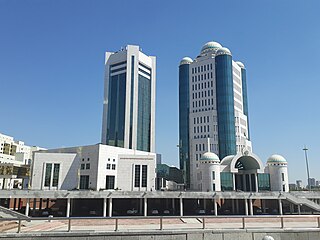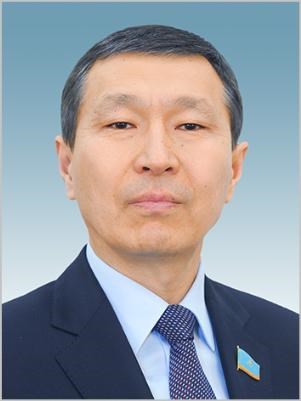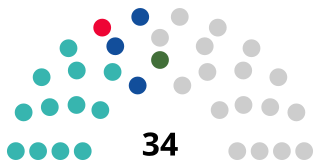
The politics of Kazakhstan takes place in the framework of a semi-presidential republic, whereby the President of Kazakhstan is head of state and nominates the head of government. Executive power is exercised by the government. Legislative power is vested in both the government and the two chambers of parliament.

The Parliament of the Republic of Kazakhstan is the bicameral legislature of Kazakhstan, consisting of the upper house, the Senate, and the lower house, the Mäjilis. Both chambers conduct legislative sessions at the Parliament House in the capital of Astana.

The Mäjilis of the Parliament of the Republic of Kazakhstan, commonly shortened as Mäjilis or Mazhilis, is the lower house of the Parliament of Kazakhstan, alongside the upper house Senate. Together, they form the national bicameral legislature of Kazakhstan, responsible for enacting legislation. Established by the Constitution of Kazakhstan following the 1995 constitutional referendum, the Mazhilis was first convened in 1996. The chamber plays role in the legislative process, debating and passing laws, where lawmakers discuss key issues facing the country and propose solutions to address them by representing the interests of constituents.

The Senate of Kazakhstan is the upper house of two chambers in Kazakhstan's legislature, known as the Parliament (Parlamenti). The Senate is composed of elected members: two from each region and two from three municipalities which are Almaty, Astana, and Shymkent.

Amanat, known as Nūr Otan until 2022, is the ruling political party of Kazakhstan. It has been the ruling party of the country since 1999, and claimed a membership over 762,000 people in 2007. Amanat has been led by Erlan Qoşanov since 26 April 2022.

Nurlan Zairollauly Nigmatulin is a Kazakh politician who served as the Chairman of the Mäjilis from 22 June 2016 to 1 February 2022 and from 20 January 2012 to 3 April 2014. Prior to that, he headed the Presidential Administration of Kazakhstan, and was the first deputy chairman of Nur Otan from 2009 to 2012, and äkim of Karaganda Region from 2006 to 2009.

The Security Council of the Republic of Kazakhstan is a constitutional advisory body of the Kazakh Government which aides and assists the President of Kazakhstan in implementation of military policy and law enforcement. The President, who is the Supreme Commander-in-Chief of the Armed Forces of Kazakhstan, is one of many permanent members of the council, which includes the Minister of Defence and the Chief of the General Staff.

Maulen Sagatkhanovich Ashimbayev is a Kazakh politician who is serving as a member and chairman of the Senate of Kazakhstan. He served as the First Deputy Head of the Presidential Administration from 2019 to 2020, Assistant to the President of Kazakhstan in 2019, First Deputy Chairman of Nur Otan from 2018 to 2019 and member of the Mäjilis from 2016 to 2018.
Military Courts of the Republic of Kazakhstan are the specialized courts of the Armed Forces of Kazakhstan that deal with criminal cases concerning military personnel and the civilian personnel of the Ministry of Defence. The military courts are part of the judiciary of Kazakhstan. It is often noted as a common criticism that military courts generally have more connection to the government than other courts by virtue of going through the military hierarchy, which has been seen as a threat to judicial independence. Military courts consider civil cases by active servicemen or citizens who undergo military training against their will, among other things.

The Central Election Commission of the Republic of Kazakhstan is a state body in Kazakhstan, which heads the unified system of election commissions.

The Parliament of the Republic of Kazakhstan of the 6th convocation was the legislative term of the Parliament of Kazakhstan.

Nūrlan Mäjitūly Äbdırov is a Kazakh politician who is currently serving as the Chairman of the Central Election Commission of Kazakhstan. Prior to that, he was the Deputy Chair of the Senate of Kazakhstan from 2020 to 2022 and was a member of the Mäjilis from 2009 to 2020.
Muhambet Jumanazaruly Köpeev is a Kazakh politician who served as a member of the Senate of Kazakhstan from 29 November 2005 to 24 November 2011 and was its Deputy Chairman. Prior to that, he was Minister of Emergency Situations from 30 September 2004 to 11 August 2005 and was a member of the Mäjilis from 1996 to 2004 where he was Mäjilis Deputy Chairman from 1 December 1999 until 2004.

The Chairman of the Mäjilis of the Parliament of the Republic of Kazakhstan is a presiding officer of the lower house Mäjilis of the Parliament of Kazakhstan, and is responsible for opening sessions, preside over regular and extraordinary joint meetings. The post was formed on 30 January 1996 at the first parliamentary session opening after the 1995 constitutional referendum which was held in August 1995 where majority of Kazakh voters approved of the new constitution which created a bicameral legislature that included the lower chamber Mäjilis.

The Astana City Mäslihat is a unicameral legislature of Kazakhstan’s capital city of Astana. The deputies of the City Mäslihat are elected concurrently with the deputies of the Mäjilis. The City Mäslihat deputies perform their duties by approving plans, economic and social programs for the city's development.

The Parliament of the Republic of Kazakhstan of the 7th convocation was a convocation of the Parliament of Kazakhstan from 2021 to 2023.

The Jambyl Regional Mäslihat is a unicameral local legislature of the Jambyl Region. Convening in Taraz, the Mäslihat consists of 36 members and three parties of which are the Nur Otan (NO), Ak Zhol Democratic Party (AJ), and Auyl People's Democratic Patriotic Party (AUYL) in which the NO controls the supermajority of 30 seats. The Secretary of the Mäslihat is currently Mahmetğali Sarybekov (NO).

The Karaganda Regional Mäslihat is a unicameral legislative branch of the Karaganda Region formed in 1993 where it convenes in Karaganda. As a decision-making body, the Mäslihat adopts resolutions and measures for the region and elects its own Secretary of which is Serık Öteşov. The Mäslihat has 38 members, who since 2021 have been elected through party-list proportional representation. Currently, the legislature is allocated among four parties with the Nur Otan (NO) controlling the majority of 29 seats followed by Ak Zhol Democratic Party (AJ), Auyl People's Democratic Patriotic Party (AUYL), and People's Party of Kazakhstan (QHP) with each having three mandates to be parliamentary opposition to NO's majority.

The Parliament of the Republic of Kazakhstan of the 8th convocation is the current convocation of the Parliament of Kazakhstan.

The acting president of the Republic of Kazakhstan is a temporary post provided by the Constitution of Kazakhstan. This role is assumed by an individual who fulfills the duties of the president of Kazakhstan in cases of incapacity or vacancy. However, the acting president is more limited in power, as they cannot propose constitutional amendments.














